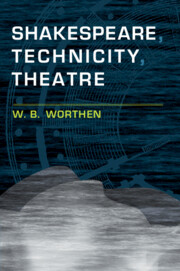Book contents
- Shakespeare, Technicity, Theatre
- Shakespeare, Technicity, Theatre
- Copyright page
- Contents
- Illustrations
- Acknowledgments
- Chapter 1 Introduction: Theatre, Medium, Technology
- Chapter 2 The Face, the Mask, the Screen: Acting and the Technologies of the Other
- Chapter 3 Shax the App
- Chapter 4 Interactive Remediation: Original Practices
- Chapter 5 Designing the Spectator
- Chapter 6 And Or And Not: Recoding Theatre
- Notes
- Works Cited
- Index
Chapter 4 - Interactive Remediation: Original Practices
Published online by Cambridge University Press: 22 May 2020
- Shakespeare, Technicity, Theatre
- Shakespeare, Technicity, Theatre
- Copyright page
- Contents
- Illustrations
- Acknowledgments
- Chapter 1 Introduction: Theatre, Medium, Technology
- Chapter 2 The Face, the Mask, the Screen: Acting and the Technologies of the Other
- Chapter 3 Shax the App
- Chapter 4 Interactive Remediation: Original Practices
- Chapter 5 Designing the Spectator
- Chapter 6 And Or And Not: Recoding Theatre
- Notes
- Works Cited
- Index
Summary
Although the early excitement of “Original Practices” Shakespeare has perhaps waned, the gesture of restoring some element of early modern stage practice and technology remains – as it has at least since William Poel – an important dimension of modern Shakespeare performance. Rather than a general nod to Elizabethan sets and costumes, or to a more-or-less bare stage, OP impels a more urgent, if not always systematic, effort to restore the tekhnē of early modern theatre (acting, design, architecture, music), making the claim to do (mainly) Shakespeare, (mainly) Shakespeare’s way. The list of these practices is extensive, ranging from the use of reconstructed theatre buildings (Shakespeare’s Globe and the Wanamaker Playhouse, the American Shakespeare Center (ASC) Blackfriars in Virginia), or their simulacra (the Shakespeare Tavern Playhouse), to single-gender – typically all-male, sometimes all-female – acting companies, to outdoor open-air performance, to rehearsing from cue-scripts rather than complete texts, to using First Folio texts and actor training designed to reinforce the rhetorical and sometimes the semantic value taken to be signaled by their typography, to playing to the audience, to performing in the other OP, “original pronunciation.”1 Although all of these elements are rarely applied in a single production, and many are applied inconsistently (all-male companies rarely feature boys; the ASC punctuates its performances with modern pop music, an original cognate, so to speak), they provide a persistent impulse of contemporary Shakespeare production, however divergently interpreted and practiced. OP is understood to offer (at least one dimension of) an authentic theatrical experience of Shakespeare, one that is immediate, or, more carefully phrased, un-mediated, “stripped,” as Christie Carson puts it, of apparently alienating “technological intervention” (“Democratising” 121). Yet while Carson locates OP as distinct from the technology of the modern stage, it would be more accurate to characterize the restorative apparatus of OP as using the contemporary stage to remediate early modern theatre, to represent “one medium in another” (Bolter and Grusin, Remediation 45).
- Type
- Chapter
- Information
- Shakespeare, Technicity, Theatre , pp. 104 - 146Publisher: Cambridge University PressPrint publication year: 2020



